Main Players
Victor Schoelcher (1804-1893)
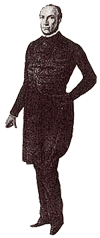 Born on July 22, 1804, in Paris, son of a porcelain maker Marc Scholcher. He dedicated his life to defend the freedom of the blacks and to the equality among all the citizens. Further to a business journey in Mexico in 1828, he discovers Cuba where slavery appears to him as a horror. Back in France, he publishes articles, books, multiplies the movements of information and adheres to the society for the abolition of the slavery. Under secretary in the temporary government of 1848, he contributes to adopt the decree on the abolition of the slavery in colonies. The decree signed with all the members of the government was published in “le Moniteur”, on March 5. Representative of Guadeloupe and Martinique from 1848 till 1851, he sits to the left. The coup of Louis Napoleon pushes him to exile in England until 1870. After Napoleon III’s abdication, he is reelected as delegate for Martinique in the National Assembly ( 1871 ) then irremovable senator ( 1875 ). Buried in the “Pere Lachaise”, the ashes are transferred in 1949, to the Pantheon.
Born on July 22, 1804, in Paris, son of a porcelain maker Marc Scholcher. He dedicated his life to defend the freedom of the blacks and to the equality among all the citizens. Further to a business journey in Mexico in 1828, he discovers Cuba where slavery appears to him as a horror. Back in France, he publishes articles, books, multiplies the movements of information and adheres to the society for the abolition of the slavery. Under secretary in the temporary government of 1848, he contributes to adopt the decree on the abolition of the slavery in colonies. The decree signed with all the members of the government was published in “le Moniteur”, on March 5. Representative of Guadeloupe and Martinique from 1848 till 1851, he sits to the left. The coup of Louis Napoleon pushes him to exile in England until 1870. After Napoleon III’s abdication, he is reelected as delegate for Martinique in the National Assembly ( 1871 ) then irremovable senator ( 1875 ). Buried in the “Pere Lachaise”, the ashes are transferred in 1949, to the Pantheon.
Henri Grégoire calls the Abbot (1750-1831)
Clerical and politician, he joins the “Tiers-États” and is one of the representatives of the extreme left, in the Constituent Assembly where he demands not only the total abolition of privileges but also the universal suffrage.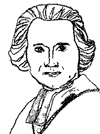
In November, 1780, he is the first to lend oath of allegiance to the civil Constitution of the clergy. Named constitutional bishop of Blois in 1791, it is elected to the “Convention”, he multiplies his papers favorable to the Blacks and contributes to the vote of the abolition of the slavery and to the recognition of civil and political laws granted to the Jews. He participates in the creation of the Conservatory of Arts and Crafts, fights to broadcast the French language. Member of council of the Five hundred 1795-1798, the legislative body, senator from 1802, He tries in vain to organize the “Gallican” church. Wild opponent of the Consulate and the Empire, victim of calumny, He withdraws to Auteuil. During the bicentenary of the French Revolution, the ashes were transferred to the Pantheon.
Alphonse de Lamartine (1790-1869)
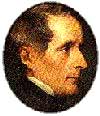 Born in Mâcon, Lamartine receives a religious education, he discovers Italy in 1811 before putting himself to the service of Louis XVIII. Bored, he devotes himself to writing. In 1820, he publishes “les Méditations “. Attaché in Florence, married to a Lady, he composes in 1830 “les harmonies poétiques et religieuses “. The death of his daughter is going to change his faith. He undertakes a political fight.
Born in Mâcon, Lamartine receives a religious education, he discovers Italy in 1811 before putting himself to the service of Louis XVIII. Bored, he devotes himself to writing. In 1820, he publishes “les Méditations “. Attaché in Florence, married to a Lady, he composes in 1830 “les harmonies poétiques et religieuses “. The death of his daughter is going to change his faith. He undertakes a political fight.
Entering the chamber in 1834, he presents numerous laws including the abolition of the capital punishment. Become influential and showing opposition to Louis Philippe’s regime, it is one of the actors of the days of 1848. Member of the temporary government, he is also one of the protagonists of the abolition of the slavery
The succession of the Second Empire terminates its political career. Holding debts, he can not choose exile. Persuaded of imperial danger, he takes refuge in writing, publishing historic works, social novels, autobiographical works as well as poetic collections. In 1869, the family refuses the national burial to which he had the right.
François Auguste Perrinon (1812-1861)
François Auguste Perrinon was born at St.-Pierre (Martinique, FWI) into a free black family during the slavery period of the colony, but sent to mainland France for his education. He enrolled in the French National Technical School (École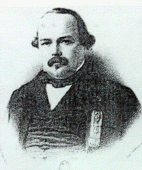 Polytechnique), with a specialization in Naval Artillery.
Polytechnique), with a specialization in Naval Artillery.
In 1842, he was sent back to the Caribbean as part of the French colonial army’s garrison on the isle of Guadeloupe. But he was of anti-slavery sympathy, and in 1847, in a pamphlet he authored entitled “Résultats d’expérience sur le travail des esclaves” (“The Slave-Labor Experience”) describing events on the isle of St.-Martin, he endeavored to argue that the work being performed by slaves at the time could just as well be performed by free people and at equal cost. A year later, he was appointed to the Commission for the Abolition of Slavery, and was sent to Martinique as “Commissioner of Abolition”, later becoming General Commissioner and holding that post from June to November of 1848.
In 1849, he was elected, along with his close friend Victor Schoelcher, deputy to the French National Assembly.
In the wake of a coup d’état of 2 Dec., 1851, in France, he returned to the Caribbean to live on St.-Martin, where he was involved in operations in the salt marshes. His refusal, in a letter of 18 Apr., 1853, to take an oath of allegiance to Napoléon III, got him expelled from the military ranks.
Jean-Baptiste Labat :
 Born in Paris in 1663, Dominican of shock, belongs to the legend of Martinique.The father Labat is present in many places in Martinique. On is arrival, he is allocated to Macouba’s parish of which he reconditions buildings.
Born in Paris in 1663, Dominican of shock, belongs to the legend of Martinique.The father Labat is present in many places in Martinique. On is arrival, he is allocated to Macouba’s parish of which he reconditions buildings.
From 1694 till 1705, the father Labat is an engineer, a builder, a fighter and a writer. “The New journey in Isles of America” will be a frank best seller. He is the best and the most complete of the columnists of the heroic time of the Small West indies.
By 1696, he becomes a prosecutor – property manager of Fonds-Saint-Jacques, property of the Dominicans. he bases the parish of François, where he develops and modernizes sugar industry. The manufacturing processes of the sugar owe a lot to the father Labat.
Pierre Belain d’Esnambuc : (1585- 1637)
Born as the third eldest child into a family of minor nobility in Allouville (Normandy) in 1585, Pierre Belain d’Esnambuc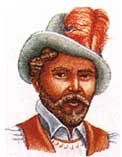 ultimately became a swashbuckling adventurer, striking out in search of fortune on the high seas. Starting in simple pursuit of a Spanish galleon, he ended up taking over the isle of Saint-Christophe (now St.-Kitts), and did such a great job with this island that he received from Cardinal Richelieu the right to settle all other islands in the Caribbean not under Church occupation. So in 1635 he landed on Martinique, at the site of present-day St.-Pierre, to lay claim to the island, but stayed only six months before falling ill and returning to Saint Christophe where he died in 1637.
ultimately became a swashbuckling adventurer, striking out in search of fortune on the high seas. Starting in simple pursuit of a Spanish galleon, he ended up taking over the isle of Saint-Christophe (now St.-Kitts), and did such a great job with this island that he received from Cardinal Richelieu the right to settle all other islands in the Caribbean not under Church occupation. So in 1635 he landed on Martinique, at the site of present-day St.-Pierre, to lay claim to the island, but stayed only six months before falling ill and returning to Saint Christophe where he died in 1637.
Jean-Baptiste, comte de Rochambeau : (1725- 1807)
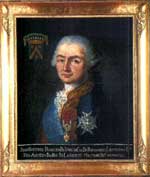 Marshal of France. Officer as soon as 1742, named general lieutenant. Governor of Picardy and Artois, he was named to the head of the army of the North in 1792, but replaced a bit further by Luckner. Imprisoned under the terror, he escaped the guillotine because of Robespierre’s fall.
Marshal of France. Officer as soon as 1742, named general lieutenant. Governor of Picardy and Artois, he was named to the head of the army of the North in 1792, but replaced a bit further by Luckner. Imprisoned under the terror, he escaped the guillotine because of Robespierre’s fall.
Armand Jean Du Plessis, Cardinal de Richelieu : (1585- 1642)
Catholic priest and French politician. Though originally headed for a career in the arms industry, an abrupt career-change occurs when the possibility of becoming the bishop of Luçon presents itself, when his brother turns down the post in favor of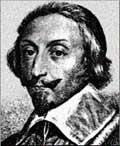 the monastic life. The excellent and energetic prosecution of his administrative duties in the management of his diocese, as well as the zeal with which he pushes missionary work, gets Richelieu elected as a delegate from the clergy to the Estates General — a council periodically called by the King of France usually in order to raise tax money — of 1614, and also helps him catch the attention of the queen mother (Marie de Medici) and of the first-minister Concini, and become appointed as a minister (then called “a Secretary of State”) in 1616, and in 1624 he is installed as a royal advisor in the royal council of advisors (conseil du roi). Richelieu is known principally for the major role he played in the creation of the French navy and his intensive activities in the fields of commerce and imperial colonialism.
the monastic life. The excellent and energetic prosecution of his administrative duties in the management of his diocese, as well as the zeal with which he pushes missionary work, gets Richelieu elected as a delegate from the clergy to the Estates General — a council periodically called by the King of France usually in order to raise tax money — of 1614, and also helps him catch the attention of the queen mother (Marie de Medici) and of the first-minister Concini, and become appointed as a minister (then called “a Secretary of State”) in 1616, and in 1624 he is installed as a royal advisor in the royal council of advisors (conseil du roi). Richelieu is known principally for the major role he played in the creation of the French navy and his intensive activities in the fields of commerce and imperial colonialism.
(Source http://www.esclavage-martinique.com/uk/main-players.php)


